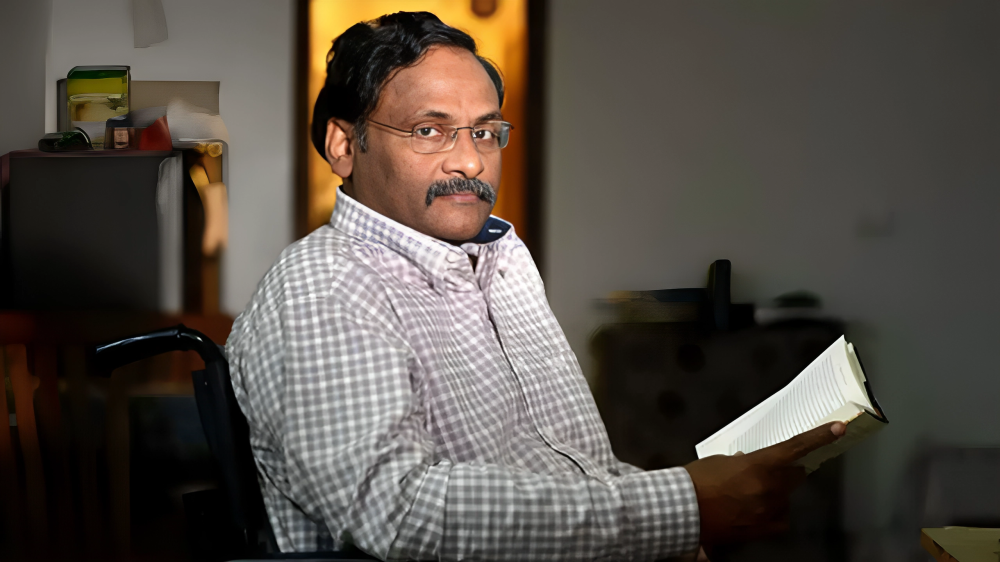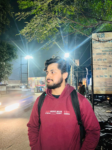GN Saibaba, Former DU Professor & Scholar, Granted Acquittal from Bombay HC in an Alleged Maoist Case

Image Source: Times Now
The Nagpur bench of the Bombay High Court passed an acquittal order for G.N Saibaba on Tuesday; this comes 15 months after he was discharged by the same court whose order got stayed by the SC, which had suspended the HC judgment and directed them to rehear the case. The professor is 90% disabled and reportedly cannot even get on a bed without assistance.
The court also acquitted five others accused in the case who were indicted on similar charges of having affiliation with Maoists and waging war against India. One of the accused, Pandu Narote, died in 2022 after contracting swine flu.
While hearing the issue, a division bench of Justice Valmiki SA Menezes & Vinay G Joshi released the professor, citing a lack of evidence against the accused and failure to prove the charges beyond reasonable doubt (the burden of proof in criminal cases is on the prosecution to prove it beyond doubt) and further held the application of UAPA as null and void; and that the trial was done without mandatory compliance which equates to a failure of justice. According to the judgment, from Sections 43-A, B, which contain provisions of arrest, seizure, and search; sanction of arrest of all the accused to the statutory presumption under Section 43-E, the trial was a complete disregard of the whole act.
The court also said, “The prosecution has not established that the speeches made in these videos are in the nature of support of any banned organization under the UAPA. We are of the opinion that the prosecution ought to have connected the content of the speeches to some past incidents of terrorism or violence & the mere presence of other accused in these videos by itself would not make out any case for the prosecution; in fact, there is no deposition on record identifying various accused in these videos or deposing to the specific parts of the speech or actions in these videos which constitute a terrorist act under the UAPA.”
While Commenting upon the Maoist and naxal literature, the bench added “The content of these documents, if taken cumulatively, would perhaps demonstrate that the accused were sympathizers of a Maoist philosophy or sympathized with the cause of certain tribal groups or certain people who were perceived to be marginalized or disenfranchised, and mere possession of such literature, having a particular political and social philosophy by itself is not contemplated as an offense under the UAPA,” just because the accused were found in possession of such literature, no inference of guilt can be drawn from that neither does it make them intrinsically wrong.
Furthermore, they observed that the act of weaponizing the personal beliefs of someone against them saying it would, to a certain degree, violate Article 19 enshrined in the Constitution which protects freedom of speech and expression, and also repudiated the whole argument saying that merely because a citizen downloads such material you cannot convict them unless there is specific evidence by the prosecution which can show a nexus between the accused and incidents of violence and terrorism to charge them under the Section 13, 20 & 39 of UAPA.
The prosecution also failed to produce any reliable electronic evidence; the bench refuted all the produced evidence and said that none of it identified by any witness and that they could not establish the evidence in accordance with the law.
The court further expressed skepticism at the aforementioned evidence and questioned as to why it was seized by an illiterate panch witness despite the presence of educated witnesses on the University premises.
While concluding the judgment, the bench said, “The entire prosecution is vitiated on account of invalid sanction to prosecute all the six accused, they have failed to establish legal arrest and seizure from them and failed to establish the seizure of incriminating material from the house search of G.N Saibaba.” and proceeded to drop all the charges under UAPA, declaring the entire case as not substantial and sustainable in the eyes of law.
In response, the Maharashtra government immediately sought a stay on the order which was promptly denied by the High Court saying, “We have already acquitted the accused and directed their release forthwith if not required in any other case. We cannot stall the order which may affect the right to personal liberty.” the order is now pending before the Supreme Court.
G.N Saibaba was first arrested back in 2013 in connection with his alleged ties with Maoists and organizations like RDF (Revolutionary democratic front), his belongings were subsequently seized which included documents, hard disks, and pen drives. Four years later he, along with five others, was sentenced to life imprisonment by a Sessions Court of Maharashtra, under charges of criminal conspiracy and waging a war against the country; they were purportedly going to circulate Naxal and Maoist literature to underground Naxalites and the residents of Gadchiroli to cause unrest and instigate people against the government.
Ever since his incarceration, he has been inflicted with several ailments and has not been provided proper medication, he was also denied a plea for house arrest on medical grounds. The professor suffers from hypertrophic cardiomyopathy, pancreatic problems, heart issues, and hypertension, among other things.
Like Stan Swamy, Saibaba faced a similar ordeal back in 2022 when he struggled to obtain a plastic water bottle for himself that took him more than three weeks and a hunger strike.
In 2022, a report by Article 14 recounted a letter sent by Saibaba to her wife Vasantha Rao, which paints a grim picture, “The winter cold has begun in Nagpur already. My muscles in my legs, hands stomach, and chest are getting spasms and severe pains. I am not able to bear the pain and have become much weaker after two attacks of Covid and one of swine flu. No one is interested in providing emergency medical treatment for the cyst in the kidneys and brain. Though the doctors at Government medical college wrote for an immediate requirement to treat these and other fatal ailments.”
Team Profile

- News Writer
- Rahul Tiwari, a law student, possesses a keen interest in politics, movies, music, and the pop culture landscape. Equipped with an unyielding spirit for writing, he navigates through his diverse interests with enthusiasm and dedication.
Latest entries
 English10 March 2024Rahul Gandhi to Contest from His Former Seat of Wayanand in the Lok Sabha Elections, Shashi Tharoor to Contest from His Citadel; Everything You Need to Know About Their List
English10 March 2024Rahul Gandhi to Contest from His Former Seat of Wayanand in the Lok Sabha Elections, Shashi Tharoor to Contest from His Citadel; Everything You Need to Know About Their List English8 March 2024Being Critical of Kashmir’s Abrogation is not an Offence; SC Quashes Case Against a Kashmiri Professor for Condemning the Scraping of Article 370
English8 March 2024Being Critical of Kashmir’s Abrogation is not an Offence; SC Quashes Case Against a Kashmiri Professor for Condemning the Scraping of Article 370 English7 March 2024SBI Misses Deadline for Electoral Bonds Disclosure; Opposition Calls It Dubious
English7 March 2024SBI Misses Deadline for Electoral Bonds Disclosure; Opposition Calls It Dubious English7 March 2024GN Saibaba, Former DU Professor & Scholar, Granted Acquittal from Bombay HC in an Alleged Maoist Case
English7 March 2024GN Saibaba, Former DU Professor & Scholar, Granted Acquittal from Bombay HC in an Alleged Maoist Case









